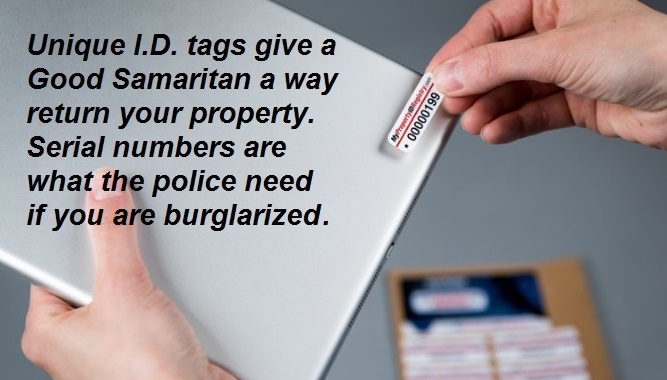Register your stuff like you register a car —
When you buy a new car, you tag and title it. By law, there is a linking of the vehicle ID number (VIN) and you. This happens at the federal level, the state level and the county level. A massive database keeps track of the who, what and where of motor vehicles.
Since 1963, the police have been urging citizens to do something very similar with electric and motorized tools and portable electronics. Even in our technological age, this old-school strategy is still being recommended by law enforcement professionals.
This is a privacy-protected registry
Sometimes when you buy a new product, there is a registration card that comes with the item. That is NOT what our security system is about. We provide you with a privacy-protected registry that only you can access. It’s purpose it twofold. First. In the event of a crime, you give the police the serial numbers of the items stolen when you file a police report. Second. The ID tags that you affix to your items are a lost & found for Good Samaritans to reunite you with lost property, and a smoking gun if the the police catch someone red-handed. When the police or a Good Samaritan enters the ID tag number in the FOUND page of our website, a privacy-protected email is sent to you.
D.I.Y. security system
Just like an automobile, your portable electronics and power tools have serial numbers. In some cases, serial numbers are not only printed on the case, but are also embedded electronically in the device. By affixing an industrial-strength ID tag to your valuables, and recording the make, model and serial numbers on the database, you have a security system based on a well-researched and extensively tested strategy called Operation Identification.
Serial numbers are pure gold for the police. Without serial numbers, there is very little the police can do.
Overcoming cynicism about loss and theft
Because of public cynicism, the police have great difficulty in solving burglaries. Because of public apathy, when the police do recover stolen items, which happens much more than you think, there is zero way to legally tie those items back to the rightful owner without a serial number listed somewhere.
The police actually have a very robust system for catching the bad guys. If a serial number of a stolen item is available, the police enter it into the FBI’s National Crime Information Center (NCIC). This makes it nearly impossible to sell a stolen item through a pawn shop anywhere in the nation. If the police engage in investigations on Craigslist, with serial numbers in hand, they now have an opportunity to make an arrest. Finally, the police execute search warrants and find huge caches of stolen property for which there is no record of being stolen.
Giving Good Samaritans a fighting chance
Good Samaritans are also without any recourse when they find locked personal electronics with no outward identification. Research suggests that when a piece of property is clearly marked with a way to easily reunite it with its rightful owner, a Good Samaritan is more likely to act.
Sadly, it is thought that over half of thefts and losses are never even reported by the victim because of cynicism. Is it any wonder that some lost & found services have recovered items in the tens of thousands, such as the London Transport and the airline’s unclaimed baggage service, because the people who lost the item immediately give up.

